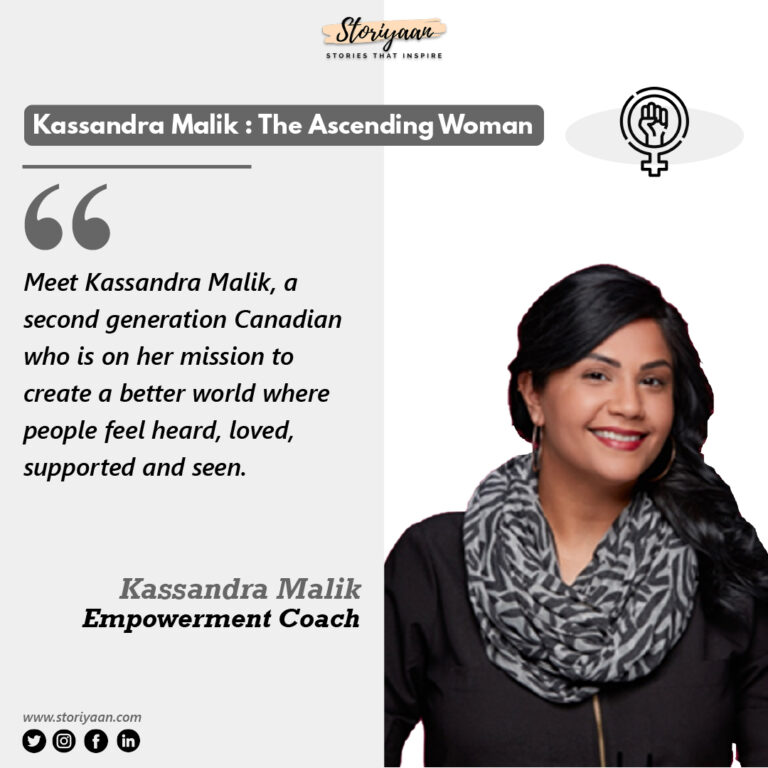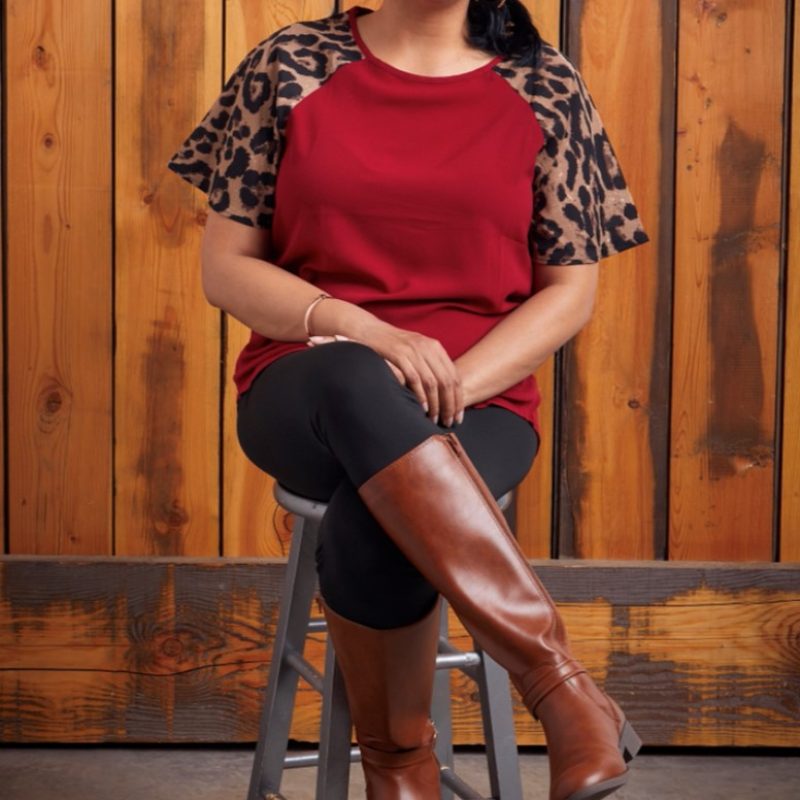“Empathetic presence involves listening to someone’s pain with what I call the five A’s: attention, acceptance, appreciation, affection, and allowing”— David Richo.
Kassandra Malik, who is a second-generation Canadian and daughter of immigrant parents and has had first-hand experience of this dilemma. She is a Mental Health Therapist and Empowerment Coach whose purpose is to empower daughters of immigrants and women of colour to conquer self-doubt so they can create their own life paths. She is kind, compassionate, powerful, intuitive, smart, creative and a lifelong learner. She is a mother, a friend, a daughter, a cousin, and an aunty.
The Founder of The Ascending Woman, Kassandra describes herself as a recovering people pleaser who is on a journey to find her voice and path. Her mission is to create a better world for women, especially her daughter – a world where women feel heard, loved, supported, and seen. She believes that all individuals are experts in their own lives. Kassandra feels honoured to support and walk alongside women who are on a journey to reclaim their path.
In her conversation with Storiyaan, she shares her immensely inspiring journey and teaches us how a woman, with her sheer will, can overcome her fears and build a stronger version of herself. Read to know more.

Kassandra Malik : The Ascending Woman
Interview
Questions and answers
Can you share with us the factors that led you towards a career as an empowerment coach?
Throughout my career as a mental health therapist, I noticed that many of my female clients were having difficulty taking simple steps forward when it came to doing things for themselves. Having shared this struggle, I decided to learn more about how to motivate individuals into action and that brought me to the coaching field.
Can you elaborate for our readers what are some of the benefits they can reap when they seek the guidance of an empowerment coach for themselves?
A coach will help you uncover where your mental blocks are and hold you accountable for your choices to keep you on track. For example, if you want to build self-confidence, a coach will help you explore what’s limiting you, draw on your strengths and assist you in forming a plan with action steps to get you closer to goal achievement.
What are some of the age-groups/ professions that should definitely go for coaching and why?
Any age group or profession can access coaching and likely benefit. There are many different coaching niches specific to the area you would like to improve in. For instance, I specialize in helping women of color and daughters of immigrants conquer self-doubt so they can create a path in life that works for them.
Can you share with us the events that drew you towards the cause of empowering daughters of immigrants & women of colour?
A second-generation Canadian, I grew up in a traditional household with strict rules and values, where I was not role-modelled self-care, self-love, boundaries, and healthy relationship dynamics. I had many people-pleasing tendencies and lacked confidence. After my separation, I recognized that I wasn’t treating myself well and that had to change. No one deserves to be treated badly or feel like they’re “less than”. This is what brought me to empowerment coaching.
What are some of the initiatives that you have already taken for the same and what are some of your future goals for them?
Ultimately, my goals for the initiatives listed below are to continue to create awareness and empowerment for the women who are interested in making changes.
- I am creating awareness around self-love, self-care, healthy habit formation and boundaries through my social media platforms.
- I have a free mindset reset tool available on my Instagram bio to help women get started on their journey of healing.
- I am in the process of launching a blog and digital resources that would be accessible to women globally to help them shed that self-doubt.
- I recently just finished writing a book chapter in the BLU Talk series which will be coming out in the fall.
As a bicultural person, can you share with us some of the challenges that you have had to overcome with time?
1. Navigating two cultures was a challenge – I was born in western individualistic culture but was raised to value collectivism.
2. I was married to someone born and raised in Pakistan, so adjusting to cultural roles and expectations was an interesting journey and ultimately the marriage ended which was another challenge to overcome.
3. The “What will people think?” mindset was crippling for making decisions that served me.
4. The – “If I care for myself, I’m selfish” mindset. I understand now that self-care is not selfish, it makes me a better mother, friend, aunty, coach, and daughter.
5. Learning about boundaries and their importance. You do not have to be everything to everyone, your time and energy matters.
When you initially started as an empowerment coach, what were some of the hurdles that you had to overcome in terms of building your credibility?
I am still building my credibility as a coach. Though I am a registered mental health professional, coaching in the online space is unregulated. Initially, one hurdle was the fear of going on camera and sharing my message. Now that I’ve built more confidence, I want to make sure that the right people are seeing my content so that they can start building a life path which is more aligned with what they want.
What impact did the pandemic have on you professionally and what were some of the patterns that you noticed in your clients during this period?
Professionally, there was a higher demand for service in my private practice as a therapist. I am mindful of noticing when I start to feel burned out or stressed, so I made sure to ramp up my self-care during the pandemic so I could continue to be of service. Many clients were suffering from symptoms of depression and anxiety which stemmed from the uncertainty the pandemic caused.
Can you walk us through your methodology of building a bond of trust and confidence with a client who usually has difficulty opening up?
I approach each client knowing that they are an expert in their own lives. I meet individuals where they’re at – meaning, they can decide what they feel comfortable sharing. To assist, I ask probing open-ended questions like “What brings you here today?”, “Tell me a bit about yourself?”. From experience, a client is more willing to “open up” when a warm tone of voice is used and there is genuine interest in the conversation.
Can you tell us the significance of the name “the.ascending.woman” and what made you choose it?
I chose the Ascending Woman because I knew I had to change and shift the way I was thinking and living. To ascend means to “go up,” and I believe that we all have the capacity to rise up against our challenges and live fulfilling lives.
Rapid fire
- One book that will always be your comfort read – “The Subtle Art of Not Giving a F*ck” by Mark Manson
- Your favorite way to wind down after a tough day – listening to a podcast while going for a walk
- You never start your day without- a short meditation and setting a positive intention for the day
- One way for students to tackle procrastination – Action comes after motivation – put aside 10 minutes a day (set a timer) and work towards the goal you would like to achieve.
- One of the ways that always helps you connect to your ancestral root – preparing a traditional East Indian dish (Biryani is my favorite)

